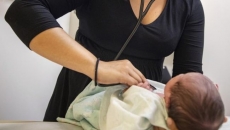OTTAWA - A new report says hundreds of thousands of Canadians may have missed out on government money intended to help with the rising cost of living because the housing and dental benefits rolled out last year have had "atrocious" take-up.
The analysis by David Macdonald, senior economist at the Canadian Centre for Policy Alternatives, assesses both benefits, as well as how much the federal government has actually spent on the measures.
He compares the federal government's estimates in the fall economic statement with updated figures provided on its website at the end of March.
Macdonald finds only 44 per cent of those who would have likely been eligible for the one-time top-up to the Canada Housing Benefit actually received it, while just over half have received the Canada Dental Benefit.
"These are pretty atrociously low take-up rates. We should be learning lessons from this (so) the next time around we have much higher take-up rates," Macdonald said in an interview.
The housing benefit offered $500 to low-income renters. Applications closed on March 31.
The federal dental benefit was rolled out in the fall to provide families with up to $650 per child under 12 for dental care. It was the first step toward creating a national dental care program, a key promise in the Liberals' confidence-and-supply agreement with the NDP.
It's become more common for the federal government to administer benefits directly through the CRA in an effort to get money to people faster, but Macdonald says his analysis suggests changes are needed.
Macdonald attributes the low numbers to several factors, including a more "invasive" application process when compared to the Canada Emergency Response Benefit. The housing benefit, for example, asks applicants to submit rent receipts or a letter from their landlord.
He says the federal government could have eased the requirements for applying, or at the very least, better informed Canadians about the programs.
"We could email people below a certain income threshold and say, 'Hey, you're likely eligible for this program,'" Macdonald said, noting the CRA has tax filing data that could guide this work.
In a written statement, the Canada Mortgage and Housing Corporation said it and the CRA launched a range of communications and outreach activities to make people aware of the benefit. It also said that estimates of how many people would be eligible, presented when the program was announced, were "an upper range" and that reaching that number would be challenging "given the voluntary nature of the program."
The low take-up means the federal government spent less than it allocated for the measures.
The fall economic statement estimated that the housing benefit would cost about $1.2 billion, but the final figure was just under $400 million, meaning only one-third of the allocated funds went out to low-income renters.
The dental benefit was estimated to cost $352 million for the 2022-23 fiscal year, but only $156.3 million had been disbursed by the end of March, amounting to about 44 per cent.
The federal government estimates 500,000 children will benefit from the support, which is available in two periods until June 30, 2024.
The federal government has advertised both measures as part of its affordability plan and Finance Minister Chrystia Freeland has touted the benefits as help that is targeted to those who need it the most.
But the updated figures suggest many Canadians may have been left behind amid a cost-of-living crunch.
"The government is failing to move this money to the people who need it most, that are going to have the most difficulty in affording higher prices due to inflation. And that's a shame," Macdonald said.
Freeland's office did not respond to a request for comment by deadline.






